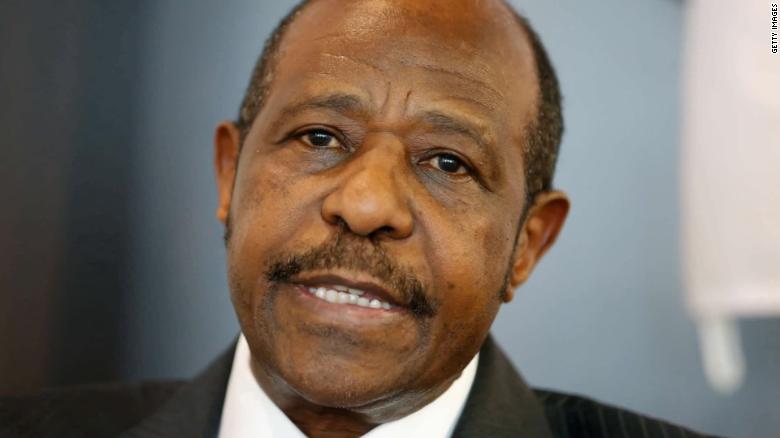(CNN)The son of Hotel Rwanda film hero Paul Rusesabagina has spoken of his family's shock at his father's arrest on terror-related charges.
Trésor Rusesabagina told CNN his mother and sister spoke to his father last Thursday by phone while Paul Rusesabagina was traveling in Dubai.
"That is the last time we talked to him, that is the last time we heard from him and ever since that it has just been silence," he said, adding that he did not know why his father was in Dubai.
CNN has reached out to authorities in the United Arab Emirates, but has not received a response.
Paul Rusesabagina is currently being held at a police station in the Rwandan capital of Kigali, a spokesman for the Rwanda Investigation Bureau (RIB) told CNN.
He gained prominence for saving hundreds of Rwandans during the country's genocide by sheltering them in the hotel he managed. His story was made into the Hollywood film Hotel Rwanda, starring Don Cheadle and Sophie Okonedo.
Trésor Rusesabagina said the accusations against his father are "patently false" and asked US authorities to intervene. The elder Rusesabagina is a US resident, who has lived in Texas with his family.
"Having a thought is a crime in some places," Trésor Rusesabagina said. "Being your own man is a crime in some places."
"My father is guilty of having the guts to speak up. This is political, of course it is. These are the games they play," he said, referring to the Kagame-led government in Rwanda.
Terror-related offenses
The RIB announced on Monday that Paul Rusesabagina had been arrested in connection with terror-related offenses.
The 66-year-old is accused of being the "founder, leader and sponsor of violent, armed, extremist terror outfits," the agency said in a Twitter statement.
Rusesabagina has to answer "charges of serious crime," Thierry Murangira, a RIB spokesman, told CNN. Murangira, speaking from Kigali, would not go into details about how and where Rusesabagina was apprehended. "This was done with international cooperation subject to an international arrest warrant," he said.
Rusesabagina is still at Remera Police Station, Murangira said. The investigation into his alleged crimes is ongoing and centers around alleged crimes against civilians in two Rwandan districts in June and December 2018 respectively, he said.
Murangira outlined the investigator has 15 days to determine whether the suspect should stay in custody. This can be renewed until a maximum of 90 days, per the law. "We can use less time," for the investigation, said Murangira.
Rusesabagina and his supporters have long maintained that he became a target of Paul Kagame's government after sustained criticism of Kagame's government and the conduct of the Rwandan Patriotic Front in ending the genocide in 1994.
Around 800,000 Tutsis and moderate Hutus were killed in the genocide, which was led by Hutu extremists.
He is the recipient of several human rights awards for his efforts during the genocide, including the US Presidential Medal of Freedom in 2005 and the Human Rights Prize by the Lantos Foundation in 2011, among others.
Rusesabagina also holds Belgian citizenship, according to a government source in Belgium.
Crackdown on opposition
Rusesabagina has not lived in Rwanda since 1996, when he survived an assassination attempt.
While widely praised for transforming Rwanda in the aftermath of the genocide, Rwanda's President Paul Kagame has also faced widespread criticism for human rights abuses and a crackdown on opposition.
Opposition politicians in Rwanda have often found themselves jailed on what they say are trumped-up charges for standing against Kagame in polls.
In one of the more widely publicized cases, Diane Rwigara and her mother were jailed when the former attempted to run for president in the same election as Kagame in 2017.
Diane Rwigara was acquitted of all charges including insurrection and forging of documents in 2018.
Victoire Ingabire, the leader of the FDU-Inkingi party, was jailed in 2010 for charges that included collaborating with a terrorist organization, "divisionism," "minimizing the genocide" and "genocide ideology."
She had returned to the country from the Netherlands to contest in the 2010 presidential elections after years of living abroad but was barred from running, and served eight years of a 15-year prison sentence before receiving a presidential pardon in 2018.



No comments:
Post a Comment